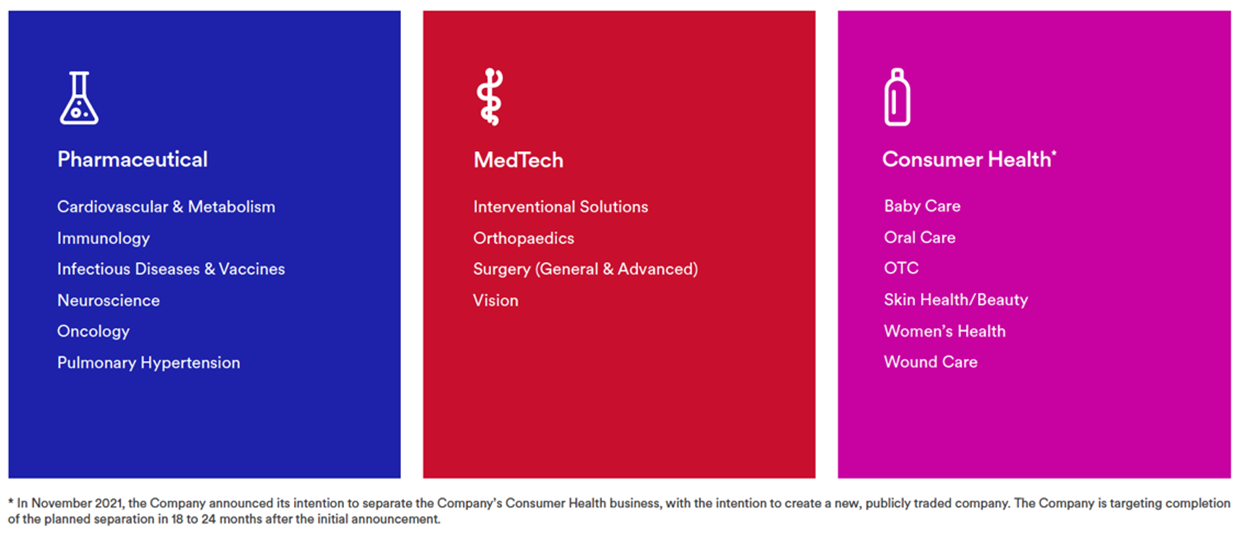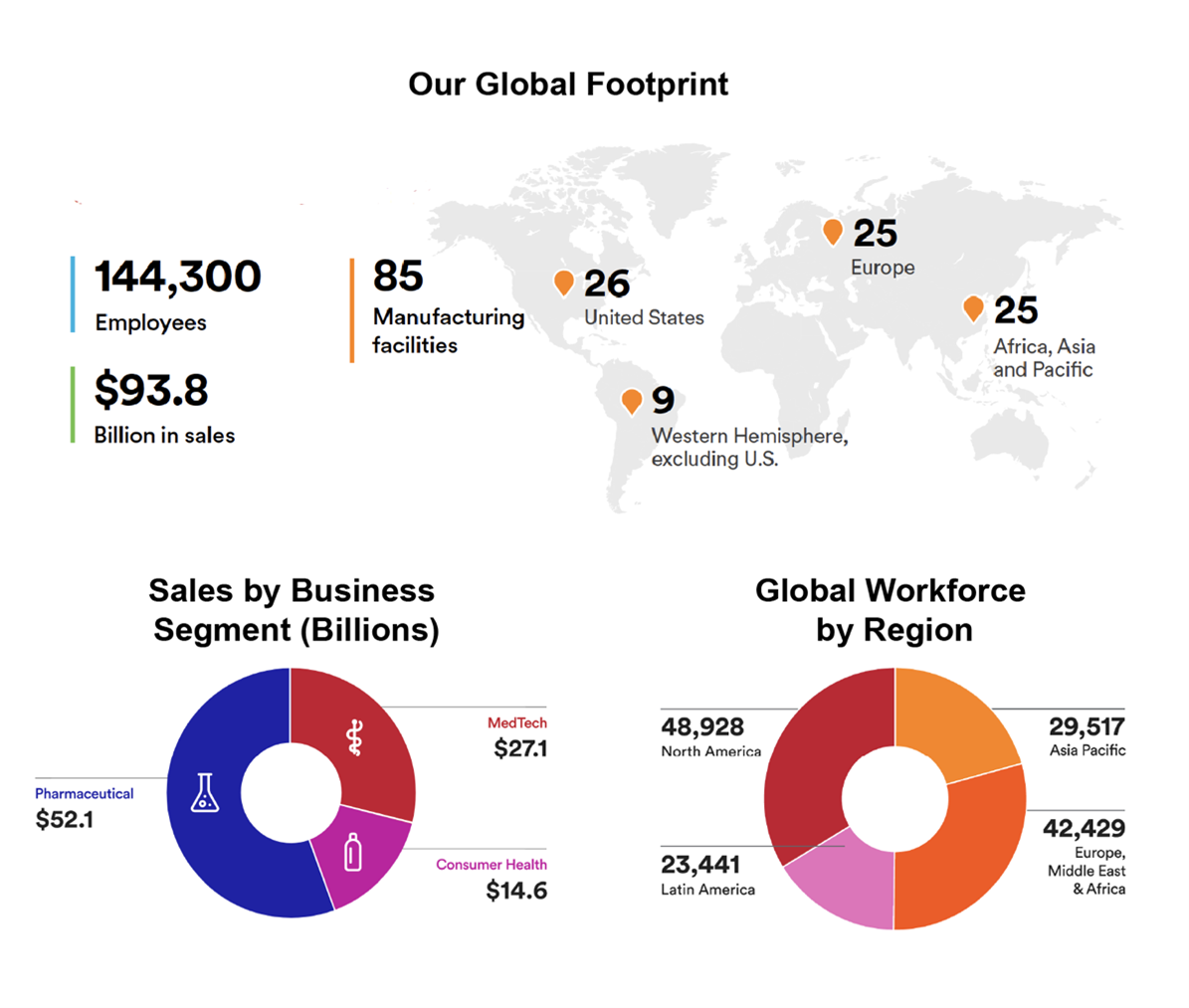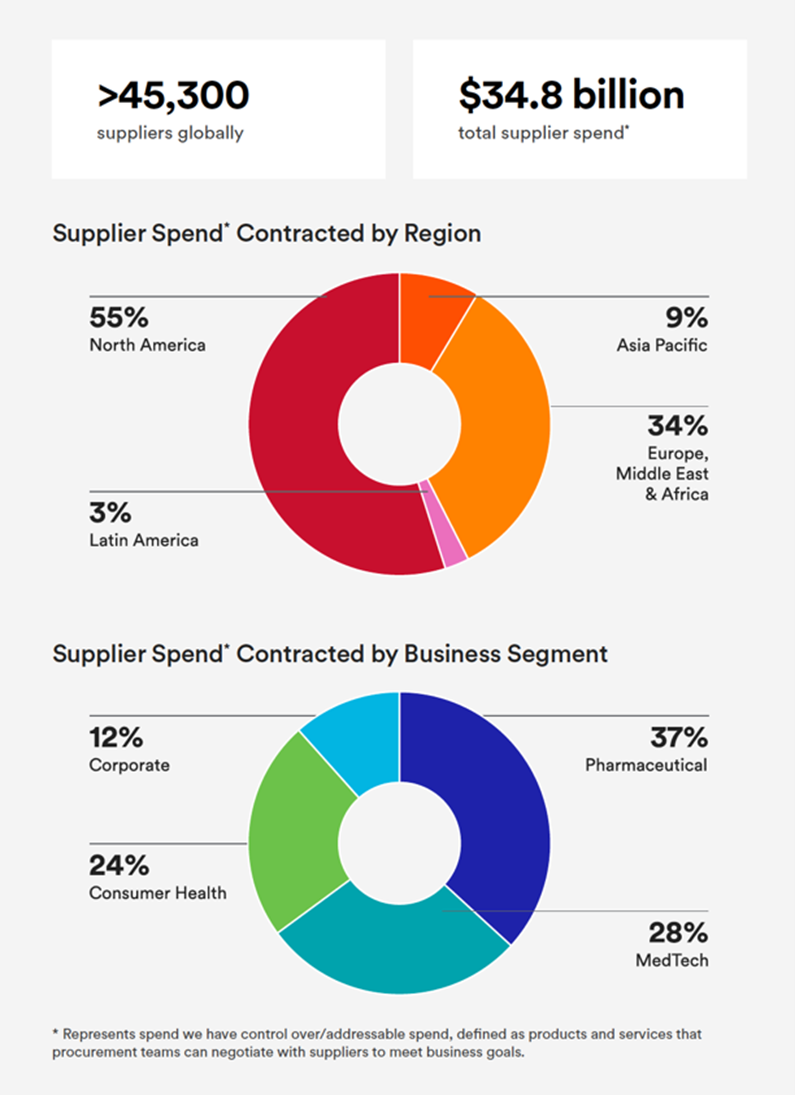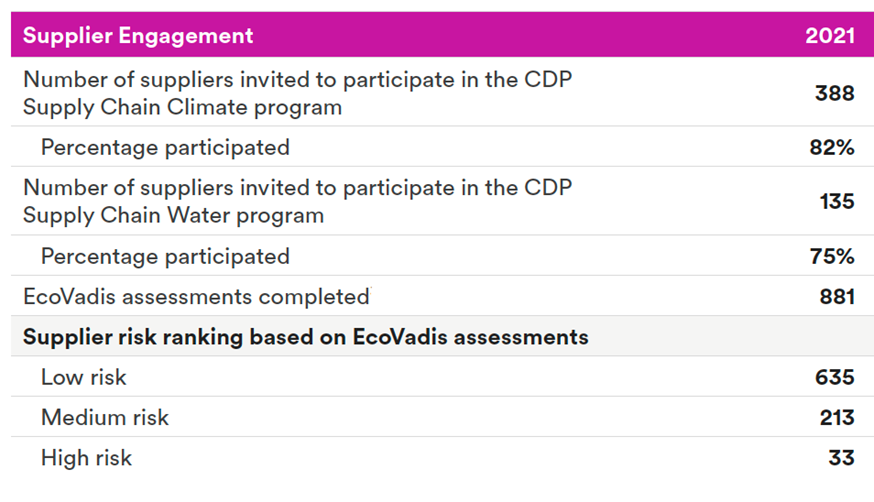This statement addresses the California Transparency in Supply Chains Act (2010), the UK Modern Slavery Act (2015) and the Australia Modern Slavery Act 2018 (Cth), and sets out the steps the Johnson & Johnson Family of Companies (“Johnson & Johnson” or “the Company”) has taken to strengthen our due diligence processes to identify and address modern slavery and human trafficking in our business operations and supply chain. This statement, together with statements issued by Johnson & Johnson affiliate companies, constitutes our disclosure for Johnson & Johnson’s 2021 fiscal year ended January 2, 2022.
Where required, authorized representatives of individual Johnson & Johnson operating companies have issued separate local statements1 and have also approved and/or signed this statement. Signed copies of those statements are available on the relevant affiliate websites and/or upon request from the relevant affiliate.
About Johnson & Johnson
Johnson & Johnson is the largest and most diversified healthcare company in the world. Our operating companies employ approximately 144,300 employees in virtually all countries of the world, who are engaged in the research and development, manufacture and sale of a broad range of products in the healthcare field. We work with more than 45,300 suppliers and hundreds of external manufacturers to support the development and manufacturing of our products worldwide. The Company’s product portfolio includes thousands of Pharmaceutical, MedTech and Consumer Health products that address the health and wellness needs of people every day.


Governance
A robust governance structure for environmental, social and governance (ESG) matters is essential to underpin the long-term success of our Company and our ability to deliver value for our stakeholders. Our sustainability governance includes oversight by the Board of Directors, management accountability, policies and management systems, and published policies and positions on key ESG topics.
The Johnson & Johnson Enterprise Governance Council (EGC) is the primary governance body for ESG topics and implementation of the Company’s Enterprise Risk Management Framework. The EGC comprises senior leaders who represent our Pharmaceutical, MedTech and Consumer Health business segments and our global Enterprise functions.
The EGC oversees our enterprise-wide human rights due diligence program. Quarterly EGC meetings provide a forum for updates on human rights topics, with an established process for elevating issues to the Johnson & Johnson Executive Committee, our Board of Directors and Board Committees if warranted. Two members of the Executive Committee, the Chief Human Resources Officer and the Chief Supply Chain Officer, serve as executive sponsors for our human rights due diligence program, providing executive support and oversight.
The Enterprise Human Rights Governance Council (EHRGC) that reports directly to the EGC is a team of experts representing main Enterprise functions responsible for various aspects of human rights due diligence and management across our own operations and the supply base, including Supply Chain, Human Resources, Procurement, Law Department, Enterprise ESG Program Office, Government Affairs & Policy, and Enterprise Sustainability.
Policies and positions
Johnson & Johnson has a longstanding commitment to respecting human rights that is embedded in Our Credo and reflected throughout our organization in the way we conduct business. Our approach to human rights, including modern slavery and human trafficking, is outlined in both our Position on Human Rights and our Responsibility Standards for Suppliers (RSS); it is also reflected in our related ESG Policies and Positions and annual regulatory disclosures.
We respect, uphold and promote adherence to fundamental and universally accepted labor rights. We support the right of individuals to freely choose their place of work and therefore prohibit the use of any forced or bonded labor in the manufacture of any product, or any component of a product, by or for any of our businesses. We do not tolerate any form of trafficking or unlawful exploitation of individuals. We also prohibit the employment of young persons (under the age of 18) anywhere in our business, other than in compliance with International Labour Organization Conventions (ILO Conventions) 138 and 182 and all applicable laws and regulations concerning age, hours, compensation, health and safety. See also our Employment of Young Persons Policy and Anti-Human Trafficking Policy.
- Code of Business Conduct
- Position on Human Rights
- Anti-Human Trafficking Policy
- Employment of Young Persons Policy
- Position on Employment and Labor Rights
- Position on Employee Compensation and Benefits
- Position on Freedom of Association
- Position on Providing a Discrimination-Free Workplace
- Position on Providing a Safe and Harassment-Free Workplace
- Position on Environmental Health and Safety Management
- Environmental Health and Safety Policy
- Position on Responsible Supply Base
- Responsibility Standards for Suppliers
- Position on Conflict Minerals
- Responsible Palm Oil Sourcing Policy
- Responsible Wood-Fiber Product Sourcing Policy
- Position on Resolving Employee Grievances
See the ESG Policies and Positions on our website for more information here.
Our commitment to respecting and promoting human rights, including modern slavery and human trafficking, applies to all Johnson & Johnson locations, operating companies and business operations worldwide. We recognize that human rights due diligence is a continuous process, and we have policies, processes, training and monitoring management systems in place in furtherance of this commitment. We expect our business partners—including suppliers and customers—to share our commitment to respect human rights. All suppliers shall comply with our RSS, which set forth our requirements around business practices. Processes are in place to identify and manage human rights risks associated with our supply base. We have also established due diligence processes to assess and monitor compliance of our suppliers with labor, employment, environment and business ethics provisions of the RSS.
Enhancing our strategic approach to human rights
2021 marked the 10th anniversary of the UN Guiding Principles on Business and Human Rights (UNGPs), representing a timely opportunity to reflect on the evolution of international efforts to respect human rights in company value chains and to consider ways in which we at Johnson & Johnson can further strengthen our approach to human rights. To achieve this, our EHRGC engaged BSR to support Johnson & Johnson to evolve our human rights strategy. Together with BSR, we conducted an enterprise-level gap analysis of our human rights approach in relation to the UNGPs, reviewed our existing priority focus areas and emerging human rights topics, and gathered insights from interviews with senior leaders at Johnson & Johnson and external stakeholders. With these inputs, we held internal workshops with key stakeholders to further develop and define a long-term strategic framework that will shape our human rights priority focus areas and action plans.
Human rights in our own operations
In 2021, we continued to strengthen our approach to due diligence in order to identify, assess and address potential and actual human rights impacts across Johnson & Johnson’s operations globally. We conducted human rights audits at key sites using the Supplier Ethical Data Exchange (Sedex) Members Ethical Trade Audit (SMETA) best practice guidance and measurement criteria. In addition, our Human Resources organization implemented a program to enhance fair labor practices in our own operations, focused on living wage and hours of work:
- Living wage: Since 2020, we have embedded an annual living wage assessment into standard compensation processes with the aim for all employees in our operations globally to receive pay that is competitive in their local markets and sufficient to support a sustainable standard of living for them and their families. The annual assessment in 2021 was undertaken, with living wage rates provided by BSR, and fewer wage gaps were identified compared with the 2020 analysis. As a result, a small number of wage adjustments were made.
- Excessive hours: In 2021, we examined the potential risk of excessive work hours for employees in our operations. Our assessment included an evaluation of hours worked in specific sites. The findings from this assessment will inform the development of a global guideline to limit work hours to 60 hours per week (including overtime) for wage employees, in line with ILO Conventions.
Our Position on Employment and Labor Rights articulates our expectations for labor and employment practices at our sites, including preventing forced labor and child labor and non-discrimination, among other matters. Our operating companies are required to respect each employee’s right to make an informed decision, free of coercion, about membership in associations and/or labor unions. Employees have the right to organize or join associations and bargain collectively, if they so choose.
- 30% of employees worldwide are covered by collective bargaining agreements.
Human rights in our supply base
We strive to work with suppliers who share our values and commitment to operating responsibly and ethically. The Johnson & Johnson RSS outlines our expectations of supplier business conduct. The RSS aligns closely with relevant provisions of the UNGPs, the Consumer Goods Forum Social Resolution on Forced Labour and Priority Industry Principles, and the Pharmaceutical Supply Chain Initiative (PSCI) Principles for Responsible Supply Chain Management

The RSS assists us with selecting suppliers who operate in a manner consistent with these expectations and helps our suppliers understand and comply. Our sourcing process includes human rights evaluation criteria in supplier selection. All suppliers are expected to comply with our RSS, and our standard Purchase Order Terms & Conditions reflect these. When appropriate, Johnson & Johnson operating companies may work with suppliers to identify agreed-upon actions and timelines to achieve improvement as a condition of initial or ongoing engagement. Johnson & Johnson operating companies consider progress in meeting the RSS and ongoing supplier performance in their sourcing decisions.
Responsible supply base
Our extended supply base comprises more than 45,300 suppliers across our three business segments. A critically important link in our value chain, Johnson & Johnson’s supplier network underpins our business continuity and enables us to manufacture and deliver essential products and services to our patients, consumers and customers. We aim to maintain collaborative and trusting supplier relationships and encourage a broad diversity of suppliers to work with us. Through our RSS, our Supplier Sustainability Program (SSP) and our Global Supplier Diversity & Inclusion program, we manage our supply base in line with Our Credo values.
Supplier engagement
We enroll suppliers in our SSP based on a number of risk metrics as well as the size of their business with us. The SSP requires, among other things, suppliers to conform to our RSS, and all suppliers in the program regularly complete an assessment by EcoVadis, a recognized provider of business sustainability ratings for global supply chains.
Auditing supplier site compliance: We verify supplier site compliance with laws and regulations as well as with other policies, including our RSS and our Position on Human Rights, through our EH&S audit program and SSP. Our EH&S audit program, which has been in place since 2006, is conducted using the audit protocol and checklist developed by the PSCI. Our social audits program, part of our SSP, is conducted in accordance with Sedex SMETA 4-Pillar guidelines and is focused on human and labor rights. In 2021, we completed 124 EH&S audits, the majority in Asia, and 11 social audits. Our audit programs in 2021 continued to be affected by COVID-19, mostly due to travel restrictions, minimizing in-person site visits and limited resources at suppliers to support audits. We continued to leverage virtual audits using video and other online tools.

Responsible sourcing
Across our business, we source commodities and raw materials in multiple categories. Some of these require heightened procurement focus due to critical environmental or biodiversity concerns or elevated human rights risks in the supply chain. We collaborate with supply chain partners to understand the potential risks and impacts of our procurement activities in these areas and define appropriate standards and controls in responsible sourcing of commodities and materials of concern.
- Wood-fiber products: Johnson & Johnson is committed to more responsible sourcing of wood-fiber products. We partner with the Rainforest Alliance to engage our suppliers and implement our Responsible Wood-Fiber Product Sourcing Policy. Learn more: Responsible Wood-Fiber Product Sourcing Policy – Progress Update
- Palm oil: We support the production and use of responsible palm oil through the implementation of our Responsible Palm Oil Sourcing Policy. We partner with the Earthworm Foundation and Action for Sustainable Derivatives to build supply chain transparency and monitor non-conformance to our commitments. Learn more: Responsible Palm Oil Sourcing Policy – Progress Update
- Conflict minerals: As members of the Responsible Minerals Initiative and in line with regulatory requirements, we remain committed to taking steps to determine the use, country of origin and source of tin, tungsten, tantalum and gold in our global product portfolio. Learn more: Annual Conflict Minerals Report available on our SEC Filings page.
Addressing non-conformance
We categorize supplier non-conformances for both EH&S and social audits as critical, major and minor, and we communicate the findings to each supplier with our expectations for a documented plan of time-bound corrective actions and demonstrated improvement. When critical findings are identified during audit, we expect immediate mitigation of the risk. We aim to maintain long-term relationships with suppliers and prefer to work with them to resolve audit findings and drive continual improvements in standards. If significant non-conformance with our standards cannot be sufficiently resolved, we withdraw existing business or decline to start business with a potential new supplier.
Post-audit support
We provide the following forms of support for post-audit supplier improvement:
- Follow-up technical visits that include expert training and best practice sharing
- Business reviews with direct coaching and guidance
- Supplier conferences, webinars and other resources
Grievance mechanisms
The Johnson & Johnson Our Credo Integrity Line provides a global, accessible channel for reporting concerns and is available 24 hours a day, 7 days a week and in 24 languages. It is independent, secure and confidential, offering a safe mechanism for anonymous reporting (where permitted by local law) of suspected concerns or potential violations of our policies or the law. We communicate the Our Credo Integrity Line access broadly, so that employees and others who work with us know this channel exists for them to raise grievances at any time. Johnson & Johnson does not tolerate threats or acts of retaliation in any circumstance. See our Position on Resolving Employee Grievances.
In order to ensure that we appropriately and efficiently address human rights within Our Credo Integrity Line, we created a separate category for those who wish to make an inquiry or report a complaint that involves a potential or actual human rights impact.
Building human rights knowledge and capabilities
Building employee capabilities: All Johnson & Johnson employees have a role to play in respecting human rights. Our Foundational Human Rights Learning and Education Course was rolled out in 2021 in 26 languages to targeted employees globally. In recognition of Global Human Rights Day in December, we promoted this course to all employees to drive further awareness and uptake. In 2022, the course will be mandatory for employees in our Procurement function and we will continue to target the training to additional employees who play a key role in delivering on our human rights commitments.
Building supplier capabilities through our SSP: In 2021, we launched our Onward Sustainability Program, part of our SSP, to focus on direct engagement with suppliers to explain our requirements and how they can best meet them. Replacing our previous static supplier toolkit, Onward is an engaging and broad-reaching series of webinars and materials in which Johnson & Johnson's procurement and sustainability subject matter experts partner with the British Standards Institution to host best-practice sharing sessions on topics relating to our goals and objectives. The program is ongoing but has included sessions on sustainability basics, starting a supplier sustainability program and how to host an audit. The live sessions and materials directly reach more than 1,000 suppliers in our SSP and are available anytime to all our suppliers in our Supplier Quality Academy. In 2021, we delivered five Onward Sustainability Program sessions, in which more than 1,000 attendees from 45 different countries participated.
Conclusion
We are committed to continuous improvement in our efforts to identify, prevent and remedy human rights abuses in our supply chain. As we make further progress in the above areas, we will report on that progress through subsequent versions of this statement.
Last Updated: June 2022
This statement was adopted and approved by the Board of Janssen-Cilag Limited on 22nd June 2022.

Gaetan Leblay
Managing Director
Janssen-Cilag Limited
22nd June 2022
______________________________________________________
[1] See our Australia Modern Slavery Statement.
